It takes a lot of hard work to come up with an invention that you can share with the world. After weeks or months of making prototypes and testing outcomes, you’re ready to turn your creation into a business. You’ve started planning sales strategies and gathering inventory, but some people have also suggested that you fill out a patent application. If you’ve wondered “Why do I need a patent?” learn how patenting can protect you now and in the future.
Why Do I Need a Patent?
A patent is a legal document granted by a government that gives the inventor exclusive rights to their invention for a limited period of time. These exclusive rights mean that no one else can make, use, or sell your invention without your permission. Basically, a patent officially declares you the legal owner of your innovation. This will give you protection against someone else stealing your idea and give you a path for legal recourse if they do.
There are a number of ways that a patent can help a new inventor.
Protection From Infringement
Perhaps the most important aspect of a patent is that it ensures you truly own your invention in the eyes of the law. This means that if someone else tries to use or sell your invention without your permission, you can take legal action against them. Without a patent, anyone could copy your invention and there would be no legal standing for you to stop them. Fighting for the right to exclusively sell the thing you’ve worked on could become an expensive and complicated process.
Competitive Advantage
A patent gives you a competitive advantage by preventing others from using or selling their invention. As the inventor, you can establish a market position and prevent competitors from entering the market with a similar product. A patent can also help you secure funding or licensing agreements with other companies, as you will have a valuable asset to offer.
Licensing and Monetization
Many inventors have a goal of making money with their new product, and a patent helps with that in a big way. A patent allows inventors to license their inventions to others for a fee. This can be a significant source of revenue for you and can help you recoup your investment in developing your new product.
 A patent can make the invention more attractive to potential investors or buyers, as they will have the assurance that you have exclusive rights to the invention. There will also be less fear about entering a crowded product market or facing tough competition for customers, as it’s easier to turn a profit with a unique offering.
A patent can make the invention more attractive to potential investors or buyers, as they will have the assurance that you have exclusive rights to the invention. There will also be less fear about entering a crowded product market or facing tough competition for customers, as it’s easier to turn a profit with a unique offering.
Increased Credibility
If you’re still wondering “Why do I need a patent,” you should also consider your standing in the market. As a new inventor, even though you know your product is great, others have little evidence to go on when you ask them to back your invention.
Obtaining a patent can increase credibility for you and for your invention. A patent is a recognized symbol of innovation and can provide assurance to potential investors, partners and customers that the invention is unique and valuable. It also shows that you are serious about the success of your product and are fully invested in what you’ve made.
What Are the Risks of Not Having a Patent?
Even with all of the benefits, some inexperienced inventors may decide to put off applying for a patent. This is a risky move, leaving you open to all sorts of problems that could end with you seeing very little profit from your ingenuity. There are a few big pitfalls for inventors without patents:
- Without a patent, the inventor has no legal protection and others can freely use, manufacture and sell the invention.
- Investors are more likely to invest in an invention that is protected by a patent, as it provides a level of exclusivity and assurance of ownership. Without a patent, you could have a hard time raising money to grow your business.
- As an inventor, you may have limited options to monetize your invention without a patent.
- You will have a much weaker bargaining position when negotiating with potential buyers, licensees or investors.
All of these problems will leave you without the ability to bring in the kind of revenue you should expect from your product. When you consider “Why do I need a patent?” think about whether these risks are worth skipping your patent application.
How Do I Apply for a Patent?
One reason some inventors put off getting a patent is the application process. New inventors may worry that it will be confusing or time-consuming, so they take the chance of going without one. The good news is the application doesn’t have to be difficult if you let Lonestar Patent Services help you.
First, the team at Lonestar will help you make sure your invention is new and doesn’t step on the toes of something that already exists. Then we’ll help you fill out the application, which typically features a detailed description of the invention, including drawings and specifications, and a set of claims that define the scope of the invention. The patent application is then reviewed by a patent examiner who will determine whether the invention meets the criteria for patentability.
Once the patent is granted, the inventor can begin to reap the benefits of having exclusive rights to their invention. The entire process can take a bit of time, but that’s why it makes sense to work with experienced representatives who know how to navigate the potential obstacles. You can get on the road to selling your product with all the protection you need as fast as you can.
Stop Asking “Why Do I Need a Patent?” and Start Protecting Your Invention
If you’ve spent time and effort creating something unique, you don’t want that effort to go to waste. You have to make sure your ideas are protected. If you’ve wondered “Why do I need a patent?” this is your answer. To get started, reach out to Lonestar Patent Services today.



